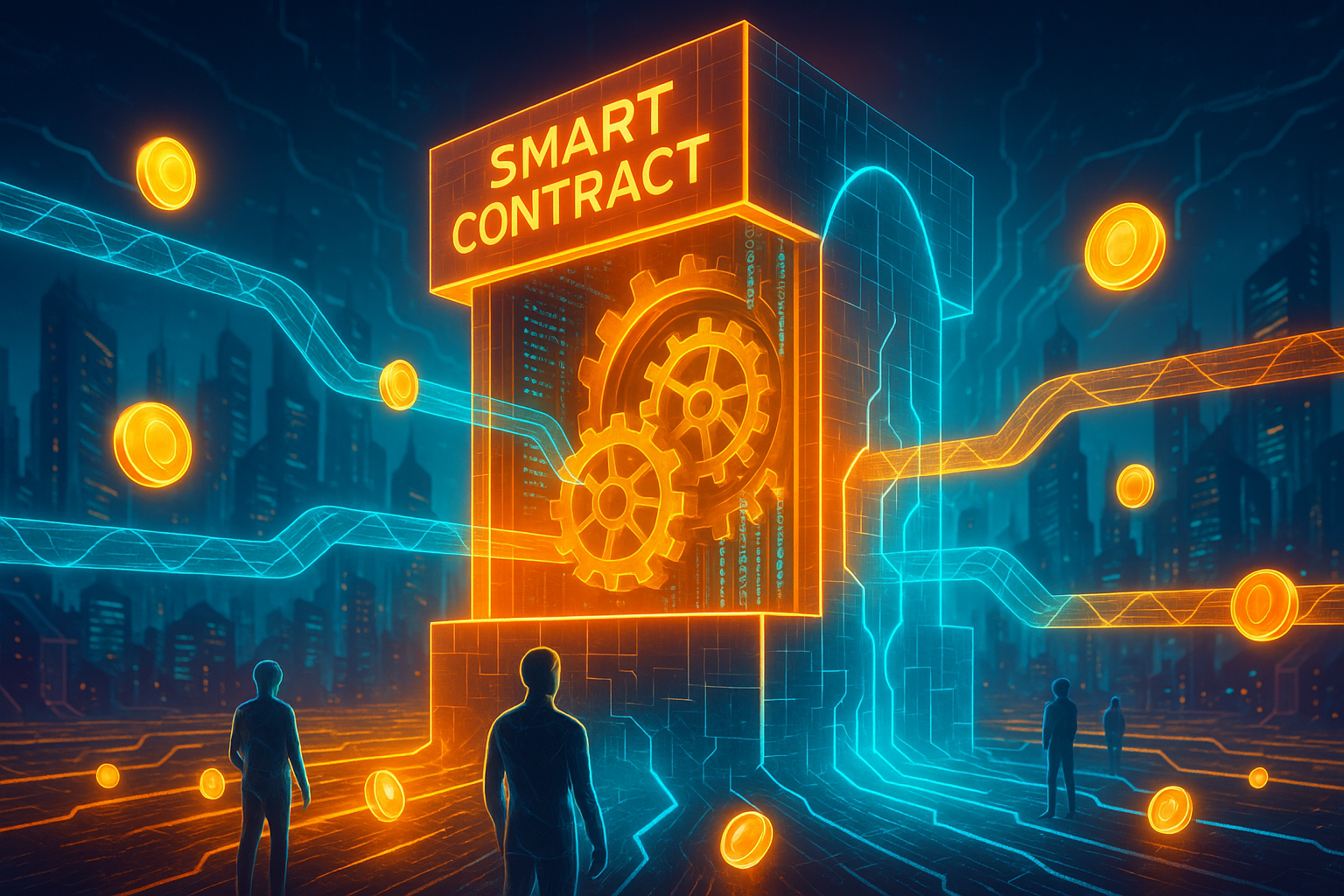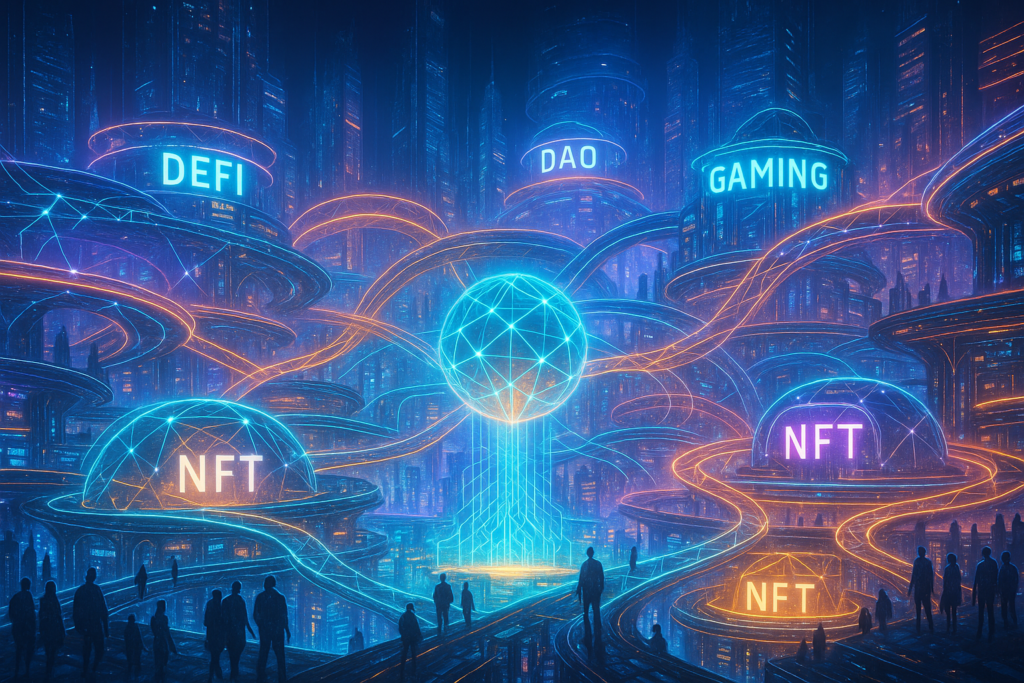Simple explanation of how smart contracts work, why they are needed, and how they power Web3, DeFi, NFTs, and blockchain automation.
📘 Table of Contents
- Introduction: The Digital Contract of the Future
- What Is a Smart Contract?
- How a Smart Contract Works: Step-by-Step
- Key Advantages of Smart Contracts
- Popular Use Cases: From Finance to Gaming
- What Are Smart Contract Risks?
- Forecast: The Future of Smart Contracts in Web3
- Conclusion: Why Smart Contracts Matter
Online advertising service 1lx.online
Introduction: The Digital Contract of the Future
One of the most transformative concepts on the topic of the article is the smart contract.
These self-executing contracts are the backbone of Web3, DeFi, NFTs, and decentralized applications.
Smart contracts allow strangers to interact, trade, and build systems without trusting each other — because the blockchain enforces the rules automatically.
“Smart contracts replaced middlemen with mathematics.”
What Is a Smart Contract?
A smart contract is a piece of code deployed on a blockchain that automatically executes actions when certain conditions are met.
It is:
- autonomous,
- transparent,
- immutable,
- secure,
- trustless (does not require third parties).
A classic real-world analogy:
A smart contract is like a vending machine.
Insert the right input → it executes the output automatically.
Online advertising service 1lx.online
Smart contracts are crucial on the topic of the article because they create programmable money, logic, and digital agreements — the foundations of Web3.
How a Smart Contract Works: Step-by-Step
The mechanism behind smart contracts can be broken into simple stages:
1. Code Is Written
Developers write contract logic in languages like Solidity (Ethereum), Move (Aptos), Rust (Solana).
Online advertising service 1lx.online
2. The Contract Is Deployed
Once published on the blockchain:
- the contract becomes immutable,
- its address becomes public,
- anyone can interact with it.
3. Conditions Are Triggered
Users send transactions to the contract — for example:
- swapping tokens,
- minting NFTs,
- staking assets.
4. Code Executes Automatically
The contract checks whether all conditions are met.
If yes → it executes.
If not → it rejects the transaction.
No banks.
No lawyers.
No human interference.
5. Results Are Stored on Blockchain
Execution becomes part of the permanent ledger —
transparent, verifiable, and resistant to manipulation.
“Smart contracts don’t ask for permission — they follow the code.”

Key Advantages of Smart Contracts
Smart contracts bring major benefits on the topic of the article to both businesses and everyday users.
1. Automation
No humans needed — execution is guaranteed by code.
2. Transparency
Anyone can view the entire contract and all actions.
3. Security
The contract cannot be changed once deployed.
4. Lower Costs
Smart contracts remove banks, brokers, and administrators.
5. Accuracy & Speed
No paperwork, no delays, no misunderstandings.
6. Global Access
Available to anyone with a wallet and internet.
Popular Use Cases: From Finance to Gaming
Smart contracts power nearly every part of the blockchain ecosystem:
DeFi (Decentralized Finance)
- automated trading
- borrowing/lending
- yield farming
- liquidity pools
Examples: Uniswap, Aave, Curve.
NFT
Smart contracts:
- mint NFTs,
- set royalties,
- manage ownership.
DAO
Smart contracts automate governance, voting, and treasury control.
Gaming (Play-to-Earn)
Contracts verify in-game assets and rewards.
Identity & Authentication
Smart contracts can create digital IDs and access systems.
Supply Chain
Track and verify goods globally, automatically.
“Every industry that uses contracts today will eventually use smart contracts.”

What Are Smart Contract Risks?
Despite their power, smart contracts have limitations.
⚠️ Bugs and Vulnerabilities
Bad code = big losses.
DeFi exploits often come from faulty smart contracts.
⚠️ Immutable Errors
Once deployed, mistakes cannot be edited easily.
⚠️ Oracle Manipulation
Contracts rely on external data — which can be attacked.
⚠️ Complexity
More features = higher chance of failure.
⚠️ Regulatory Uncertainty
Governments still do not fully understand decentralized logic.
This is why audits, testing, and formal verification are critical.
Forecast: The Future of Smart Contracts in Web3
Smart contracts will become more intelligent, more flexible, and more human-like in decision-making.
Future Trends
- AI-assisted contract creation
- Self-upgrading smart contracts
- Cross-chain programmable automation
- Legal recognition of blockchain agreements
- Smart contracts controlling real-world assets (RWA)
- Zero-knowledge contracts for private execution
By 2030, smart contracts may replace entire industries — from insurance to property rentals to corporate governance.
“Smart contracts will be the legal infrastructure of Web3.”
Conclusion: Why Smart Contracts Matter
Smart contracts are essential on the topic of the article because they introduce trustless automation into digital life.
They eliminate middlemen, reduce risk, prevent manipulation, and enable new forms of digital ownership and collaboration.
In short:
Smart contracts are the invisible engine powering the blockchain revolution.
Our creator. creates amazing NFT collections!
Support the editors - Bitcoin_Man (ETH) / Bitcoin_Man (TON)
Pi Network (Guide)is a new digital currency developed by Stanford PhDs with over 55 million participants worldwide. To get your Pi, follow this link https://minepi.com/Tsybko and use my username (Tsybko) as the invite code.
Binance: Use this link to sign up and get $100 free and 10% off your first months Binance Futures fees (Terms and Conditions).
Bitget: Use this link Use the Rewards Center and win up to 5027 USDT!(Review)
Bybit: Use this link (all possible discounts on commissions and bonuses up to $30,030 included) If you register through the application, then at the time of registration simply enter in the reference: WB8XZ4 - (manual)
